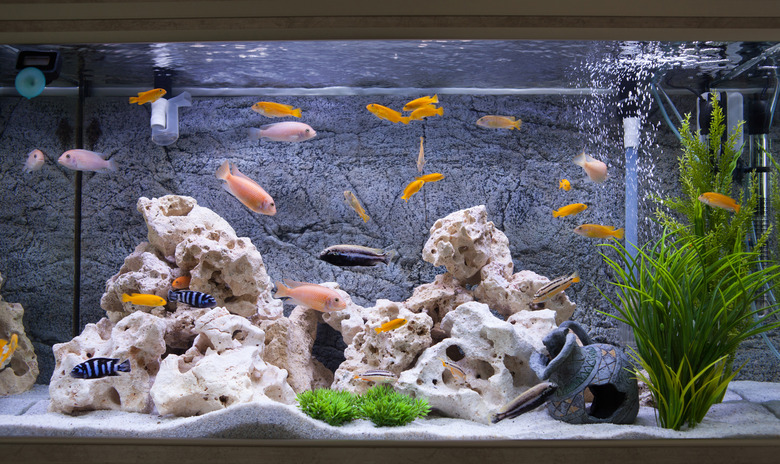What Causes Fish To Lie At The Bottoms Of Aquariums?
One of the primary enjoyments of keeping an aquarium is watching the colorful residents swimming around. Fish lying on the bottom of the tank can be worrisome, but whether it's a sign of trouble depends on several factors.
It's normal for some fish
It's normal for some fish
A fish lying on the bottom of the tank can be perfectly healthy. Many aquarium species spend a lot of time hovering along the lower third of their environment, according to the Virginia Institute of Marine Science, which is why having a more horizontally extended tank is preferable to a tall container. Bottom feeders often lie along the gravel as they sift through the substrate, gobbling up those bits of food that have sunken to the bottom.
Clown loaches are bright orange or red with thick black stripes. This freshwater fish loves tropical temperatures of 79 to 85 degrees as it hunts down snails and detritus. Kuhli loaches don't just lie on the gravel; they'll burrow their wormlike bodies into it, according to the Aquatic Warehouse. Zebrafish will usually hide out in the plants along the bottom, and Corydoras catfish enjoy hanging out with a friend or two as they scan the tank's lower limits for food.
Keep in mind that many fish sleep along the bottom of the tank to feel secure. Fish need to have a resting period when tank lights are off. Leaving the lights on can cause fish to swim to exhaustion, leaving them more susceptible to disease.
If your tank is tall, create high towers of caves that fish can hide and sleep in, and they'll start using the upper levels of the aquarium, suggests Massachusetts Institute of Technology. Be careful that the towers won't fall and trap the fish. This technique is particularly useful for cichlids and other species that dwell among rocky areas in their natural habitat.
A too hot tank
A too hot tank
Keeping your aquarium environment variables tweaked adequately is crucial to your fishes' good health. When water conditions are off, it's not unusual for fish to rest near the bottom.
Warm water can't hold as much oxygen as colder water, according to Sarasota County WaterAtlas. If water isn't correctly aerated, it is too warm or has an overload of oxygen-eating bacteria, the fish will move to the coldest water they can find. Warm water rises, leaving the coldest, most oxygenated water at the bottom of your aquarium.
Too-warm water will also cause an increase in the metabolism of your aquarium residents, according to the Virginia Institute of Marine Science. That means more excrement, producing more ammonia-producing bacteria and less oxygen — a vicious cycle that can end up killing your fish.
Fish feeling "icky"
Fish feeling "icky"
Ich — pronounced as "ick" — is a disease caused by the parasite Ichthyophthirius multifiliis. The condition is characterized by white spots that are uncomfortable for your fish, causing him to lie along the bottom of the tank and try to rub himself along the gravel, rocks, and other aquarium features. This is the most common aquarium disease that could cause fish laying on the bottom of the tank, according to the University of Florida.
It's essential to treat this disease in its early stages, as it can kill all the fish in your tank. Chemical treatments such as copper sulfate and formalin can eliminate the parasite.
Other signs your fish might be laying on the bottom of the tank include fins drooping or clamped, and swimming off-kilter. If multiple fish show symptoms, examine your water quality and take quick action to improve it. You may need to remove sick fish to a hospital tank to let them recover in a less stressful environment.
References
- Virginia Institute of Marine Science: Estuarine Aquarium Keeping for Beginners
- Aquatic Warehouse: 5 Coolest Bottom Feeder Fish to Get for a Freshwater Aquarium
- Massachusetts Institute of Technology: The Tank
- Sarasota County WaterAtlas: Dissolved Oxygen
- University of Florida: Ichthyophthirius Multifiliis (White Spot) Infections in Fish
